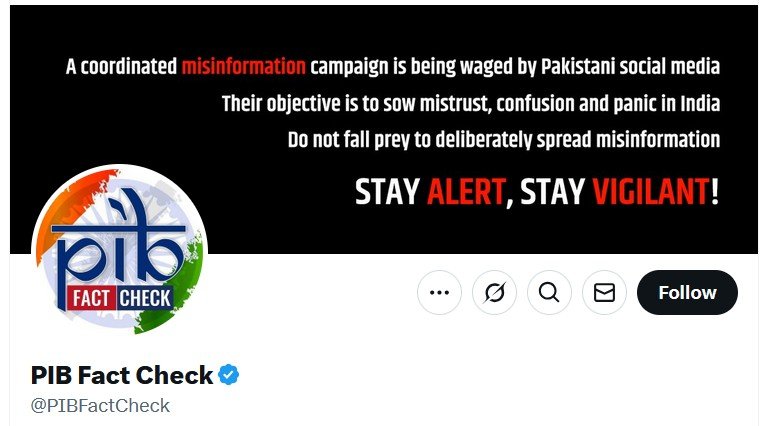Understanding @PIBFactCheck: India’s Digital Shield Against Fake News During Crisis Situations
Introduction
In the age of digital warfare, misinformation can be as dangerous as missiles. As tensions escalate between India and Pakistan following India’s reported precision strikes—unofficially termed Operation Sindoor—a new front has emerged: the battle against fake news. Amid a flood of unverified videos, manipulated images, and false narratives circulating on social media, the official fact-checking arm of the Indian government, @PIBFactCheck, has become a critical player in ensuring public awareness and national security.
This article delves into the role of @PIBFactCheck, its importance during national crises, how it functions, and why it’s more vital than ever in the current India-Pakistan conflict.
What is @PIBFactCheck?
@PIBFactCheck is the official fact-checking handle of the Press Information Bureau (PIB), Government of India. Launched in December 2019, it operates on social media platforms like Twitter (now X), Facebook, and Instagram, and is tasked with countering fake news related to the Government of India and its associated agencies.
The unit is under the jurisdiction of the Ministry of Information and Broadcasting and works round-the-clock to identify, verify, and debunk misleading or false content.

Why @PIBFactCheck Is Crucial During the India-Pakistan Conflict
1. Preventing Panic and Misinformation
With reports of India’s ongoing strike on Pakistan—triggered reportedly by the terrorist activities and cross-border infiltrations—social media has exploded with claims ranging from bombings, aircraft movement, to purported Pakistani retaliation. Many of these are unverified or deliberately fake, intended to cause fear or confusion.
@PIBFactCheck plays a crucial role by:
- Debunking viral fake videos falsely attributed to the ongoing operation.
- Clarifying official stances of the Indian Armed Forces and ministries.
- Preventing rumors from spreading among civilians and media outlets.
2. Supporting National Security
Misinformation can be weaponized by enemies. Fake news can reveal troop movements, compromise operational secrecy, or be used by foreign propaganda machines. @PIBFactCheck actively works to counter psychological warfare by neutralizing these narratives.
How @PIBFactCheck Operates
Step-by-Step Process:
- Monitoring Social Media: The team uses software tools and manual monitoring to scan for trending keywords and viral posts.
- Verification: Suspected fake news is forwarded to concerned ministries or departments for verification.
- Debunking: Once confirmed, @PIBFactCheck issues a tweet or post with factual information, often tagging major influencers and media outlets.
- Public Reporting: Citizens can report suspicious claims via:
- WhatsApp: +91 8799711259
- Email: pibfactcheck[at]gmail[dot]com
Sample Tweet:
🚨 Staged Video Alert 🚨
— PIB Fact Check (@PIBFactCheck) May 8, 2025
Fake video is being circulated by Pakistani handles alleging that an Indian Post was destroyed by the #Pakistani Army
🔍 #PIBFactCheck:
✅ The claim is completely false, and the video is staged
❌ There is no unit called “20 Raj Battalion" in the… pic.twitter.com/959rc9OrTH
Recent Actions by @PIBFactCheck Amid Current Strike
Since the announcement of India’s military response to provocations from across the border, @PIBFactCheck has been hyperactive, countering dozens of claims daily. Some of their notable interventions include:
- Debunking doctored videos of airstrikes falsely attributed to recent events.
- Clarifying false casualty figures and preventing communal disharmony.
- Busting fake notifications and press releases allegedly from the Ministry of Defence.
Impact and Reach
- Twitter/X Followers: Over 5 lakh (500K) followers
- Real-time alerts reach millions of users daily.
- Covered by mainstream media for credibility and authenticity.
- Retweeted by government officials, police departments, and embassies.
The handle has become a trusted source for journalists, influencers, and the general public alike.
Collaborations and Tools
@PIBFactCheck collaborates with:
- Cyber Crime Cells of various states.
- Social media platforms for content takedown.
- Media Literacy Programs to train citizens in identifying fake news.
It also uses AI-based verification tools and collaborates with international fact-checking networks during cross-border disinformation campaigns.
Challenges Faced
Despite its success, @PIBFactCheck faces several hurdles:
- High volume of misinformation during crises.
- Language diversity in India complicates verification.
- Deepfakes and AI-generated content make detection harder.
The Road Ahead: Building a Digitally Resilient India
The current situation highlights an urgent need for:
- Stronger cyber laws against fake news propagation.
- Public participation in verifying and reporting misinformation.
- Expanding fact-checking efforts to regional languages and local events.
In times of military operations, national unity and responsible digital behavior are as important as boots on the ground. @PIBFactCheck has proven to be a key pillar of India’s information defense strategy.
Conclusion
As India stands at a critical geopolitical juncture, battling enemies both on ground and online, @PIBFactCheck remains a silent guardian—sifting through the digital dust to reveal the truth. The responsibility, however, is shared by all citizens. Before sharing any sensitive content, verify with @PIBFactCheck—because in the fog of war, truth is our greatest weapon.

